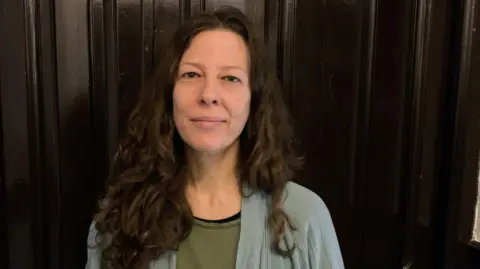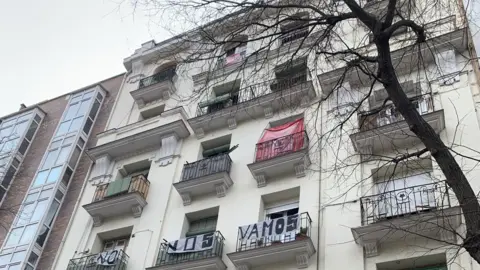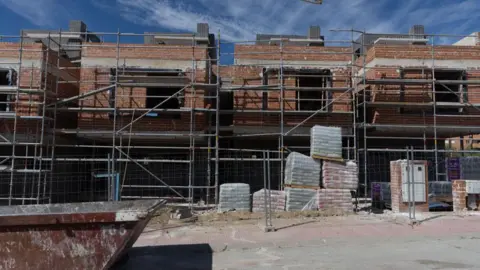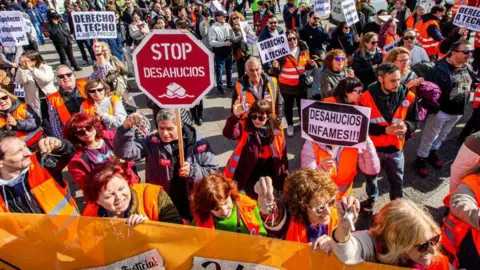Business Reporter
 BBC
BBCBlanca Castro puts the builder’s helmet before opening the door to the kitchen. Inside, the roof has a large hole that is dripping water and it seems that it could collapse at any time.
Because the kitchen is unusable, white must wash the dishes in the bathtub and improvised a kitchen area with a gas campsite stove in the corner of its living room.
Many of his tenants in this apartment block near the Atocha train station have similar problems. They say that the company that owns the building has stopped responding to basic maintenance applications in recent months, as it informed them that it will not renew its rental contracts.
« The current rental bubble encourages many large owners to do what they do here, » says Blanca. « This is to get rid of the current tenants who have been here for a long time, in order to have short-term tourist flats, or simply to increase income. »
Blanca and her tenant companions have pledged to stay in the building despite what they see as efforts to push them for the owners, who were not available for comments on this article.
Leasing contracts last five years, during which income is set, but this area of the center of Madrid has seen increasing housing costs in recent years.
« For another house like this (in this area), I should pay twice or more what I am paying now, » says Blanca. « It’s not viable. »
She and her neighbors are among millions of Spaniards suffering from the consequences of a housing crisis caused by the fall of rental costs.
Although salaries have increased by about 20% over the last decade, the average rent in Spain has doubled during the same period. There has only been an increase of 11% only in the last year, according to the figures provided by the idealist portal, and the housing has become the greatest concern of the Spaniards.
He is also raising, and the Spaniards go out to demand actions from the authorities to make housing more affordable. On Saturday, April 5, thousands of people are expected to protest in Madrid and dozens of other cities.

A report from the Central Bank Spain found that about 40% of families now rent spend more than 40% of their income on their accommodation.
« The current problem is a huge imbalance between supply and demand, » says Juan Villén, of idealist. « Demand is very good, the economy is growing very much, but the offer decreases very quickly. »
Villén offers the example of Barcelona, where rental increases have become notorious. While nine families competed to rent each property in the city five years ago, this number has increased to 54. The rental costs during this time have increased by 60%, adds.
« We have to build more properties, » says Villén. « And in terms of rent, we need more people willing to rent their properties or willing to buy properties, to reform them and to put them in the rental market. »
The central government has described the situation as « a social emergency » and agrees that the lack of supply drives the crisis. Last year, the Ministry of Housing estimated that the country needs between 600,000 and one million new houses over the next four years to meet the demand.
This need for more housing has been partly driven by the arrival of immigrants who have joined the workforce and help to promote the economic growth of Spain. The ministry also pointed out a lack of social housing, which at 3.4% of the total offer, is among the lower in Europe.
In 2007, at the height of a real estate bubble, more than 600,000 homes were built in Spain. But the high building costs, the lack of available land and a shortage of labor have been factors to restrict construction in recent years, with less than 100,000 homes completed in 2024.
The Government has taken measures to encourage construction, distributing land for the construction of affordable homes, while trying to ensure that public housing does not end in the private market, which has been a problem in the past.
 Pictures of getty
Pictures of gettyBut the socialist prime minister, Pedro Sánchez, has also expressed the desire to intervene in the market in order to control rental prices.
In a recent event to mark the opening of 218 apartments of low rent in the southern city of Seville, he stated that the Spaniards « want us to act, want the housing market to function according to the law of reason, of social justice, not in the law of the jungle; they want to ensure that the funds and speculators of the vulture do not do whatever they want. »
The central government and various local administrations have identified short -term tourist accommodation as part of the problem. Last year, the Canary Islands, the Balearic Islands and several cities in the continental part saw protests on the part of the local inhabitants against tourist numbers, with their impact on the costs of renting the main complaint.
Several councils have responded by announcing the plans to restrict the granting of tourist permits, while Barcelona goes further, revoking the licenses of all 10,000 short -term registered apartments in the city until 2028.
The Sánchez government has also promoted Parliament a housing law, which includes a rental lid in the so -called « high voltage » areas where prices are out of control. Political resistance has meant that the legislation so far is only implemented in the northern regions of the Basque Country, Navarra and Catalonia, and its success is open to debate.
The regional and central governments led by the Socialists have indicated a drop of 3.7% of the rental costs in the « high tension » areas of Catalonia since the introduction of the CAP that has been a year ago, with Barcelona a decrease of 6.4%.
However, critics warn that the rental lid has frightened the owners and made thousands of properties withdrawn from the market.
 Pictures of getty
Pictures of getty« In terms of supply, the problem is that all measures taken by local or national governments go against the owners, » says Villén. « Even people who made new rental properties have been selling their properties because they do not want to enter the rental market. »
Another initiative proposed by the Central Government that has increased the debate is a tax of up to 100% on the properties bought by non -residents from outside the EU, as these houses are often almost not inhabited. This is a measure that, if it were detached, would greatly affect British buyers.
Conservative opposition has accused the government of being too heavy with its approach. However, as public anger is based on this, there are many others who would like the country’s leaders to act much more strange.
Gonzalo Álvarez, of the Union of Inquilinas and Tenoles, an organization that campaigns for the rights of tenants, accepts that a shortage of available houses is a problem, but he insists that the most creation is not the answer.
« There is a lack of housing because the houses are abducted, on the one hand, tourist flats and, on the other hand, all the empty floors belonging to the bottom of the vulture and the benches, » he says. « So you don’t have to build more, it is not necessary. But the housing we have been abducted. »
Its organization wants the Government to impose drastic rental reductions on the owners and threatens to orchestrate a national strike by tenants who would see participants refuse to pay their income.
« Governments (central and local) do not set limits, » says Mr. Álvarez. « Then, who is it? We will have to do it. »
















Leave a Reply